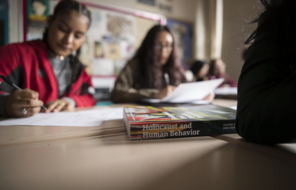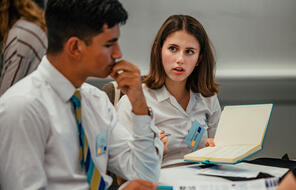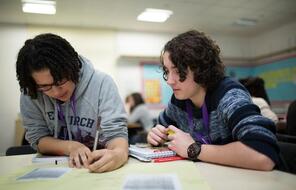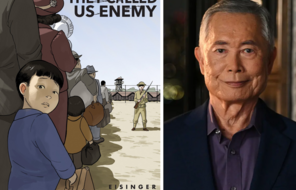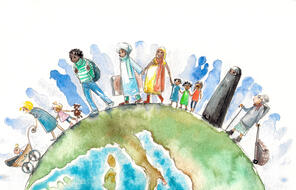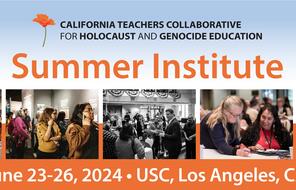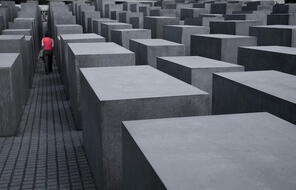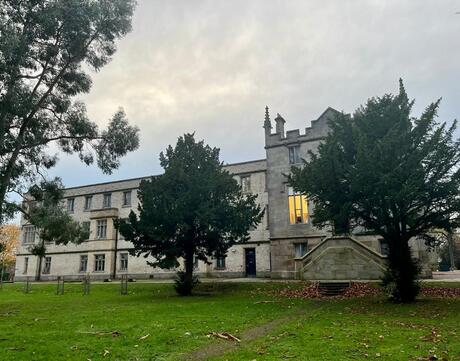
Challenging Racial and Religious Hatred in the Classroom
Islamophobia Awareness Month (IAM) was set up in 2012 by a group of Muslim organisations, with the intention to raise awareness of Islamophobia in society and to showcase the positive contributions of Muslims. To commemorate IAM this November, the programme team ran two afternoon CPD workshops for educators in London and Manchester to introduce our newest unit, Discussing Contemporary Islamophobia in the Classroom.
Recent data suggests that 72% of all hate crimes in the UK are recorded in London and Greater Manchester, which made our choice of locations to launch this CPD particularly poignant.
The workshops provided educators with a range of activities taken from the five lessons: Confronting Islamophobia; Exploring Islamophobic Tropes; Addressing Islamophobia in the Media; Understanding Gendered Islamophobia; and Standing Up Against Contemporary Islamophobia.
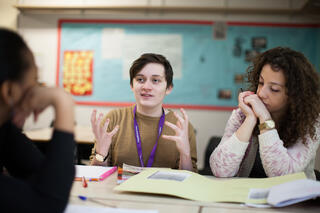
Discussing Contemporary Islamophobia in the Classroom
This unit is designed to help students in the UK reflect on how Islamophobia manifests in contemporary society and what needs to be done to challenge it.
Firstly, we considered definitions and the importance of recognising Islamophobia as a form of structural racism, before exploring the long history of Islamophobia. Participants then spent time reflecting on how lies and the truth spread, before examining a range of prominent Islamophobic tropes and narratives.
Activities from the third lesson analysed the portrayal of Muslims and Islam in the media, and reflected on how humanity’s negativity bias impacts responses to Islamophobic news content. A gallery walk activity enabled participants to explore the literary devices that are used in the media to provoke emotional responses and therein spread Islamophobia.
Highlighting this year’s theme, #Muslim stories, the fourth lesson of the unit - Understanding Gendered Islamophobia - critically explores Islamophobia through the voices and experiences of Muslim women, who are so often excluded from the narrative, or spoken about rather than to.
The workshop finished with an activity from our final lesson, Standing Up Against Contemporary Islamophobia, which asks us to reflect on belonging, and the impact of prejudice and discrimination on our sense of belonging, before exploring the concept of Upstanding and how we can challenge Islamophobia.
Our workshop in London on 14 November was very kindly hosted by the Faith and Belief Forum, and Carrie Alderton, Head of Programmes and Impact, shared some of their fantastic resources for skilled dialogue with the group.
The beautiful British Muslim Heritage Centre was the location for our Manchester workshop on 16 November. Attendees were able to visit the House of Wisdom exhibition, which showcases the incredible contributions of Muslim scholars, inventors and scientists in areas such as medicine, architecture, mathematics and engineering.
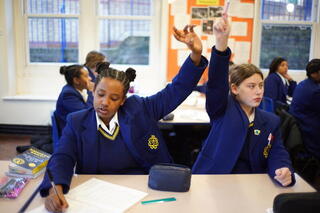
Discussing Contemporary Antisemitism in the Classroom
This unit is designed to help students in the UK reflect on how antisemitism manifests in contemporary society and what needs to be done to challenge it.
These workshops followed on from a series we ran in June, which trained 50 educators in our Discussing Contemporary Antisemitism in the Classroom four-lesson unit.
Interfaith Week runs from 12 to 19 November, offering us an opportunity to celebrate the religious diversity of the UK and to strengthen ties between communities of different religious beliefs and faiths.
On 13 November, we joined with the National Citizen Service Trust, the Faith & Belief Forum and Solutions Not Sides to bring a 90 minute webinar to youth workers and educators.
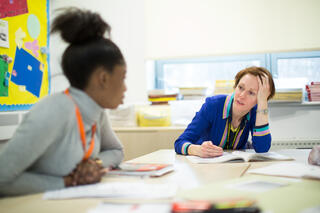
Processing the Violence in Israel, Gaza and the West Bank
Help students in the United Kingdom process violence, terror, and the loss of life in the wake of the violence in Israel, Gaza and the West Bank.
Conversations about identity, belonging and faith have become more fraught and divisive since 7 October and holding spaces for these conversations in communities with young people in any setting is becoming increasingly challenging. Alongside our partners, we discussed how conflict in the Middle East is affecting dialogue and rising levels of hate, and provided a number of practical activities to support educators in holding space to support the young people they work with.



